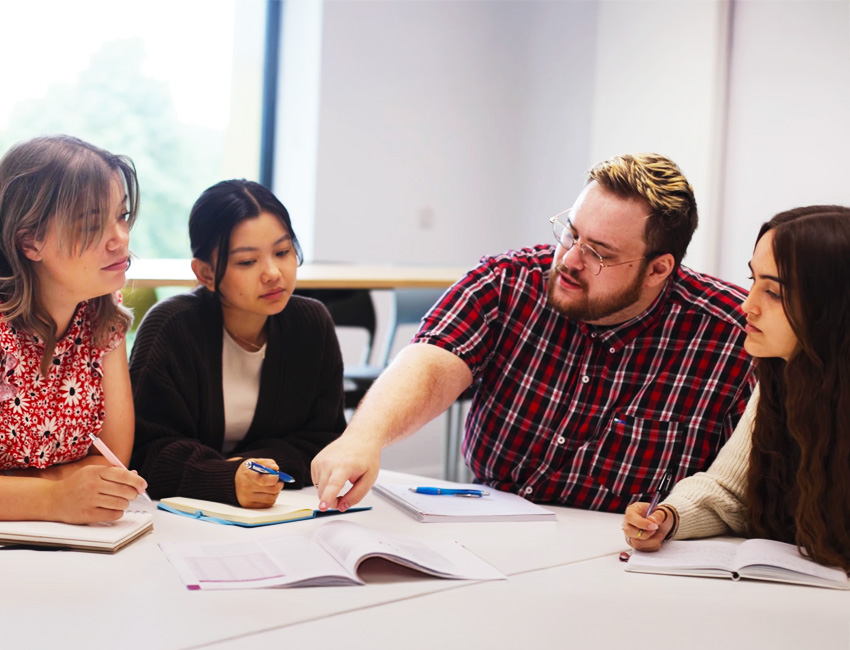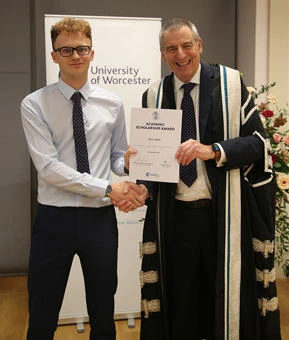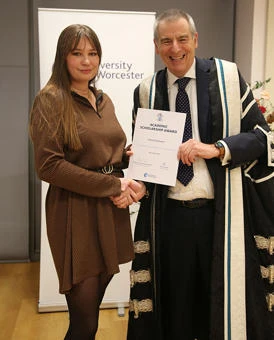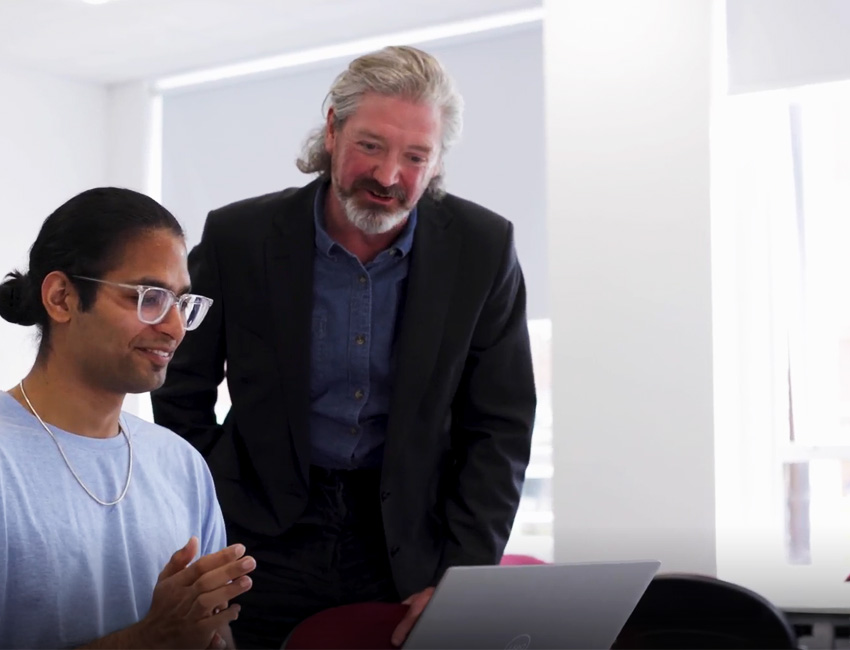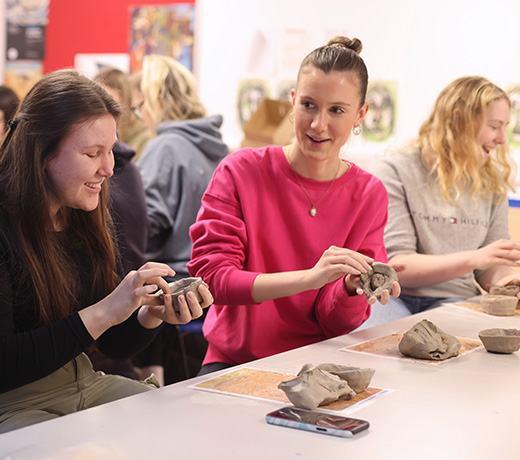At Worcester, you’ll learn from passionate teachers who believe education should be fair and inclusive. Through research and a mix of theory and practice, you’ll discover how education can shape lives and communities globally. You’ll build the knowledge and confidence to influence change in areas that matter most to you.
Students feel staff are good at explaining things
Students felt free to express their ideas, opinions and beliefs
University of the Year finalist
Recognised for our graduate success, we’re shortlisted for University of the Year in the Times Higher Education Awards 2025.
Overview
Education Studies focuses on discovering various educational theory and research, before exploring the impact this has learners in relation to educational inequality. In your first year, you’ll explore how subjects like Sociology, History, and Psychology approach education differently. In your second year, you’ll explore the concept of quality in education, examining diverse and sometimes conflicting perspectives. By your final year, you’ll be ready to instigate change, considering different perspectives, embracing inclusion, and shaping future practice.
Research is a key part of the course. You’ll learn to understand and apply academic research, design ethical projects, and complete your own dissertation. You’ll also explore how learning practices affect real people, from tackling inequality to responding to the climate emergency exploring how education can contribute to a socially just world. Tailor your studies through a range of optional modules, covering areas such as creative approaches to learning, wellbeing in education, safeguarding practices, and critical perspectives like weaponised education.
You’ll get hands-on experience as you visit with educational technology and visit specialist provisions, care farms, Pupil referral Units and placements in prison education. From day one, you’ll be supported to find your voice, explore your interests, and think creatively about how education can be more inclusive, incorporate diverse and underrepresented voices, and be equitable.
By the end of the course, you’ll be ready to take your next step, whether that’s teacher training or making a difference in education in your own way.
Education Studies at Worcester
Course content
Education is more than what happens in schools; it’s about people, communities, and change. Our modules are designed to introduce you to the foundations of current education practice; consider the sustainability of education as we increasingly become a globally connected world and develop leadership skills and your own ethics and values for educational policy and practice.
We regularly review our courses to reflect the latest research and developments in the subject area, as well as feedback from students, employers and the wider sector. As a result, modules may change to ensure the course remains current and relevant.
Optional modules will run if enough students choose to study them. It is not guaranteed that all modules will be offered every year.
Optional modules
Careers
This course equips you with the skills to work in education, training, and advisory roles across many sectors. You’ll develop expertise in learning theory, education policy, equality and diversity, and the wider social and economic context of education. Employers in both public and private sectors value graduates who understand how people learn and how to support that learning effectively.
You could progress into careers related to:
- Child welfare
- Mentoring
- Training
- Military service
- Prison education
- Lecturing
- Youth work
- International development
- Charity work
You could also progress onto further study to expand your knowledge and experience to increase your employability, such as our PGCE courses to because a qualified teacher, or our Education MA, Education MRes degree.
Student case studies
Hear from our Education Studies alumni to find out how they found they course and how it prepared them for their future.
Course highlights
Teaching and assessment
Lectures and seminars are interactive, encouraging active debate and discussion to help you apply critical thinking and your own knowledge to what is being taught. The mix of informal and formal assessments build on this further, providing the opportunity to demonstrate your understanding of what you’ve learnt through both taught and independent research, and develop your academic skills.
Teaching and assessment contents
Lectures will equip you with core information and foundational knowledge, which you can then explore further through discussion and debate in seminars. You’ll be encouraged to take an active role in your learning by engaging in group discussions, sharing your thoughts and opinions, and reflecting on how new insights connect with your prior knowledge. This process will help you consider past advances, address present challenges, and propose solutions that contribute to a brighter and more innovative future for education.
Meet the team
Find out more about our education experts who will be teaching and supporting you through the course.
Entry requirements
UCAS tariff points required: 88
| Qualification | Grade |
|---|---|
| A-level | CCD |
| BTEC National Extended Diploma | MMM |
| T-level | P (A*-C) |
An Enhanced Disclosure & Barring Service (DBS) check is required for some modules on the course.
Any questions?
If you have any questions about entry requirements, please call our Admissions Office on 01905 855111 or email admissions@worc.ac.uk.
Fees
Fees contents
UK and EU students
In 2026/27 the standard fee for full-time home and EU undergraduate students on BA/BSc/LLB degrees and FdA/FdSc degrees is £9,535 per year (subject to changes in the government tuition fee cap).
Tuition fees are reviewed annually and may increase each year for both new and continuing students.
For more details on course fees, please visit our course fees page.
International students
In 2026/27 the standard tuition fee for full-time international students enrolling on BA/BSc/LLB degrees and FdA/FdSc degrees is £17,200 per year.
Tuition fees are reviewed annually and may increase each year for both new and continuing students.
For more details on course fees, please visit our course fees page.
How to apply
How to apply contents
Applying through UCAS
UCAS is the central organisation through which applications are processed for full-time undergraduate courses in the UK.
Read our how to apply pages for more information on the application process, or if you’d like to apply for part-time study.
Contact
If you have any questions, please get in touch. We're here to help you every step of the way.

Stuart Gallagher
Senior Lecturer and Course Leader in Children and Families & Education & Inclusion
s.gallagher@worc.ac.ukAdmissions Office
admissions@worc.ac.uk01905 855111More to explore
Open Days
Visiting us is the best way to get a feel for student life at the University of Worcester.

The City of Worcester
Worcester is a welcoming university city with great transport links and plenty of student parking.

Accommodation
Benefit from our accommodation guarantee. We have rooms on campus to suit every budget including en-suite options.

